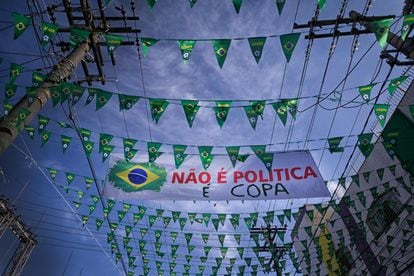A parade reads "It's not politics, it's the World Cup", on October 16 in Belo Horizonte. DOUGLAS MAGNO (AFP)
Brazil has started this new World Cup in a special climate.
It is not just that the five-time champion, who appears again as a favorite in almost all the pools, can win the trophy again.
This time it is something more, because the passion of football embraces that of politics.
Winning or losing the World Cup will unequivocally embrace the turbulent political and social situation in the country.
And this for many reasons.
There is no doubt that the winner of the elections, the ex-unionist and ex-turner Lula da Silva, who has even created a political language embodied in the soccer lexicon, is interested, like no one else, in winning the World Cup.
It would be a way to double win the elections.
On the contrary, his opponent and sulking at the political defeat, Jair Bolsonaro, prays that Brazil – read Lula – lose the World Cup.
This time, the competition, contrary to other times, is not supported by the entire nation because it has been poisoned by politics.
As is known, in Brazil the colors of the team are those of the national flag, green and yellow.
It is, however, two colors that the coup extreme right has taken over.
Green and yellow are today the colors of the defeated, Bolsonaro, and they even appear dangerous in street disputes to the point that it is thought of being able to change the colors of the national flag to detoxify it from its fascist overtones.
And if it is true that it is impossible to separate the national flag from the dream world of soccer, today it is also difficult not to confuse it with the neo-fascist airs of the root Bolsonarism that has not died with the defeat at the polls, and that tries to reorganize itself to return to power supported by by the new seismic movements of far-right politics that are shaking the world.
I have experienced several world championships here in Brazil and I have participated in the national festival that took place throughout the country, comparable only to the festive euphoria of carnivals.
This year everything is different, since the typical soccer euphoria is confused with the political rage that divides the country.
If the left, which with Lula has won the elections and dethroned the right-wing extremist, dreams of winning the championship as one more symbol that things have changed in the country, the extreme right, in which Bolsonaro seems to refuse even to pass the sash of command to the new president, he prefers to lose as long as the extorner and his followers do not have that privilege and joy.
If it is true that the ultra-right that lost the elections would also prefer to lose the World Cup so as not to see the trophy in Lula's hands, the truth is that somehow or by many at once, this World Cup, contrary to previous ones, has already been poisoned.
This is because it has been mixed with the violence that the ultra-right has generated in the country where, a sad paradox, it even creates fear to see the national flag displayed on the balcony of a house or on the windshield of a car.
The same players, the idols of soccer fans, with their recent statements for or against Bolsonaro, which is like being for or against democracy, appear this time at the World Cup wrapped in acid polemics that strip to the event of its atavistic characteristics of a national holiday.
In the five World Cup championships won, throughout Brazil, from the economic sanctuary of the Stock Market to the last shack in the favelas, a single cry of joy and pride was heard after each goal.
It was a Brazil embraced in the same national illusion.
Today things have changed and the World Cup has not monopolized the load of illusion, happiness, illusion and unity of the past.
The flag has changed, the national climate today poisoned by politics has changed and even the ball appears, instead of being round, rather with edges and colors that evoke more discouragement than enthusiasm.
Although Brazil is always Brazil and in the face of the ball and its mysteries it is possible that if it achieves its sixth world victory, people will be able to forget even the colors of the flag for a national celebration, giving it a kick, for a few moments, to the political tantrum that afflicts him.
And it is that also here in Brazil, or especially here, soccer is always soccer, that is, it is something more than a rolling ball.
Well that.
Subscribe here to the EL PAÍS America
newsletter
and receive all the latest news from the region
Sign up for free to continue reading
LOGINSIGN UP
Or subscribe to read without limits









